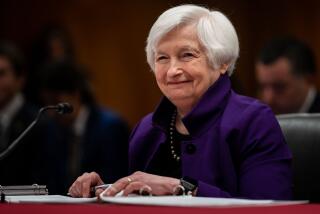Most Japanese Still Confident of Safety of Deposits : Banking: Public’s equanimity is based on trust in the competence of bureaucrats, not any firm legal guarantees.
- Share via
TOKYO — Small-business owner Noriyoshi Oe had just stepped out from a branch of Sanwa Bank when a reporter inquired whether Japan’s recent bank and credit union failures gave him concern for the safety of his deposits.
“I’m not worried. My money is fine,” he replied without hesitation. Oe said he was confident even though his savings exceed the approximately $100,000 covered by deposit insurance in Japan.
Librarian Etsuko Kotake, taking a slightly different view, confided that she was “30% worried”--a 3 on a worry scale of 10--about the stability of the major banks where she keeps her savings. But her money is spread among four banks, with no deposits exceeding the insured limit, so she doesn’t see any problem for herself.
“When you hear the news, you realize that the bad-loan problems are not limited only to the banks that went bankrupt,” she said. But “my banks will be all right for a while.”
Nervous depositors withdrew several billion dollars last week from a failed credit union in the western city of Osaka and a regional bank in nearby Kobe. But the vast majority of Japanese citizens remain confident about the safety of their savings.
The widespread equanimity is remarkable because it is based primarily on trust in the reliability and competence of bureaucrats--and faith in the way things have always been--rather than any firm legal guarantees.
Since shortly after World War II, no one has ever lost money deposited with a Japanese financial institution. Regulators have always ensured that deposits were safe, mainly by requiring that whenever an institution became too weak to survive, a stronger one would take it over.
Even now, with authorities admitting that the overall system is burdened with at least $500 billion in bad loans, few expect individual depositors to suffer losses any time in the next few years.
And for those who are afraid, a post office savings system offers an alternative with ironclad security. Its interest rates are often better than those offered by commercial banks, which attract customers on the basis of service rather than rates.
“There isn’t any sign of general uneasiness about deposits,” said Alicia Ogawa, banking analyst at Salomon Bros. Asia Ltd. “There is an enormous degree of confidence in regulators.”
This is not to say that scattered bank runs are out of the question once a specific bank is seen to be failing. Panicky depositors at Kizu Credit Union in Osaka helped trigger the collapse Wednesday of that institution and of Hyogo Bank in Kobe.
But in announcing steps to liquidate those two failed institutions, Bank of Japan Gov. Yasuo Matsushita and Finance Minister Masayoshi Takemura pledged that deposits of any size in those bankrupt firms--and in all of Japan’s financial institutions--are safe. The only caveat is that time deposits in the bankrupt institutions cannot be withdrawn until maturity.
Back in June, as attention began to focus on Japan’s bad-loan problem, the Finance Ministry announced that during the next five years, the banking system would be restructured to beef up the deposit insurance system and strengthen disclosure requirements so the public could judge the condition of individual institutions.
*
Once those measures are in place, officials said, banks might be allowed to fail without bailout measures--and deposits above legally insured limits might not be safe. But until those changes are complete, depositors need not worry, the ministry said.
These guarantees are widely believed even if they lack a firm legal basis, said Kunio Miyamoto, managing director of the Sumitomo Life Research Institute.
“Depositors of large city banks--I am one--are not worried,” Miyamoto said. “We still haven’t lost faith in the system--faith in government, faith in supervising authority.”
Japan’s major banks “are far from the danger of bankruptcy,” Miyamoto said. “The depositors of small banks and small credit unions may be more worried than the depositors of big banks. Certainly further runs cannot be excluded. But they are exceptions. They are marginal.”
Not only are Japan’s 21 major commercial banks widely considered strong enough to cope with their bad-loan problems, but the Finance Ministry has repeatedly promised it will never let any of them go bankrupt.
Small credit unions are among the weakest links in the system, and Finance Ministry officials have predicted that more of these institutions may fail. But depositors do not appear to be abandoning this sector, either.
In Osaka, for example, depositors withdrew $2 billion from Kizu from Tuesday through Thursday. But the total sum on deposit at the city’s remaining 24 credit unions actually increased by about $206 million Thursday compared to Wednesday, officials said.
Outside a small branch of the Daisan Credit Union in Tokyo on Friday, one man was so surprised to be asked about the safety of his money that at first he had trouble linking recent news events to his own situation.
“Oh, you mean like on television?” he asked. “Yes, I’ve heard about that. No, I’m not particularly worried about my money.”
Interest rates are extremely low in Japan--about 1.4% annual interest on three-year time deposits at commercial banks or in postal savings accounts, and less than 1% for demand accounts.
*
Many savers, of course, would prefer higher returns. But food, clothing and housing prices in Japan are generally stable or falling. Even at these low interest rates, deposits grow in real terms rather than being consumed by inflation.
Some credit unions or other small institutions offer slightly better rates, but many cautious savers avoid them because they believe the higher rates could be a sign of the institution’s weakness.
“All my money is deposited in four [big commercial] banks, so I’m not worried that much,” said Toshiko Matsumoto, a company executive in her 60s. “Of course it’s better to get higher interest rates. But the recession is very serious. So under these circumstances, if a bank offered higher rates I’d just get more worried. I’d never deposit my money in the banks that give higher interest rates.”
Hilary MacGregor and Chiaki Kitada of The Times’ Tokyo bureau contributed to this report.
More to Read
Sign up for Essential California
The most important California stories and recommendations in your inbox every morning.
You may occasionally receive promotional content from the Los Angeles Times.










